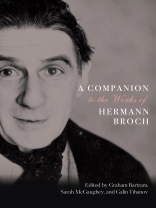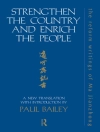Covers the major modernist literary works of Broch and constitutes the first comprehensive introduction in English to his political, cultural, aesthetic, and philosophical writings.
Hermann Broch (1886-1951) is best known for his two major modernist works,
The Sleepwalkers (3 vols., 1930-1932) and
The Death of Virgil (1945), which frame a lifetime of ethical, cultural, political, and social thought. A textile manufacturer by trade, Broch entered the literary scene late in life with an experimental view of the novel that strove towards totality and vividly depicted Europe’s cultural disintegration. As fascism took over and Broch, a Viennese Jew, was forced into exile, his view of literature as transformative was challenged, but his commitment to presenting an ethical view of the crises of his time was unwavering. An important mentor and interlocutor for contemporaries such as Arendt and Canetti as well as a continued inspiration for contemporary authors, Broch wrote to better understand and shape the political and cultural conditions for a postfascist world. This volume covers the major literary works and constitutes the first comprehensive introduction in English to Broch’s political, cultural, aesthetic, and philosophical writings.
Contributors: Graham Bartram, Brechtje Beuker, Gisela Brude-Firnau, Gwyneth Cliver, Jennifer Jenkins, Kathleen L. Komar, Paul Michael Lützeler, Gunther Martens, Sarah Mc Gaughey, Judith Ryan, Judith Sidler, Galin Tihanov, Sebastian Wogenstein.
Graham Bartram retired as Senior Lecturer in German Studies at the University of Lancaster, UK. Sarah Mc Gaughey is Associate Professor of German at Dickinson College, USA. Galin Tihanov is the George Steiner Professor of Comparative Literature at Queen Mary University of London, UK.
Tabla de materias
Introduction: Broch’s Life and Works – Graham Bartram and Sarah Mc Gaughey
Perspectives on Broch’s
Die Schlafwandler: Narratives of History and the Self – Kathleen L. Komar
Hermann Broch and the Dilemma of Literature in the Modern Age – Gunther Martens
Interrogating Modernity: Hermann Broch’s Postromanticism – Galin Tihanov
Broch and the Theater:
Die Entsühnung and Aus der Luft gegriffen as Tragic and Comic Dramatizations of the Economic Machine – Brechtje Beuker
Limits of the Scientific: Broch’s
Die Unbekannte Größe – Gwyneth Cliver
Broch’s
Die Verzauberung: Ludwig Klages and the Bourgeois
Mitläufer – Gisela Brude-Firnau
Hermann Broch’s
Massenwahnprojekt and Its Relevance for Our Times – Judith Ryan
Human Rights and the Intellectual’s Ethical Duty: Broch’s Political Writings – Sebastian Wogenstein
Broch’s
Der Tod des Vergil: Art and Power, Language and the Ineffable – Jennifer Jenkins
From the ‘Tierkreis-Erzählungen’ to
Die Schuldlosen: The Creation of Broch’s Last Novel – Judith Sidler
Broch’s Legacy and Resonance – Paul Michael Lützeler
Selected Bibliography – Sarah Mc Gaughey
Notes on the Contributors
Index
Sobre el autor
PAUL MICHAEL LUETZELER is the Rosa May Distinguished University Professor in the Humanities at Washington University in St. Louis where he has been teaching courses in German and Comparative Literature












